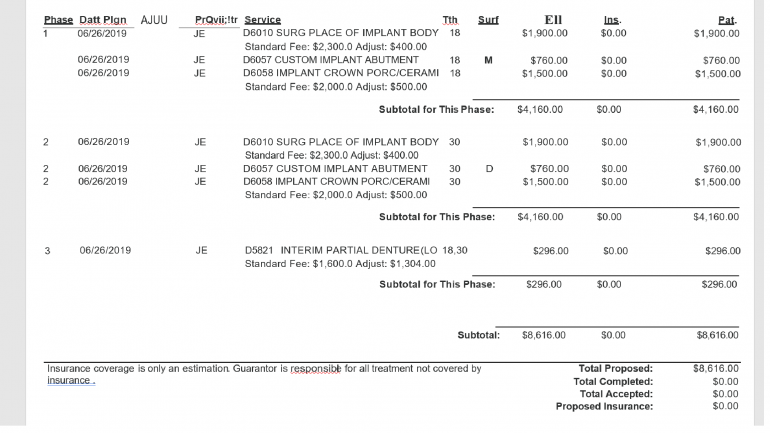
Dental Code D0603: Caries risk assessment and documentation, with a finding of high risk
Dental Code D0603 is a specific dental procedure that focuses on caries risk assessment and documentation for patients who are identified as having a high risk of developing dental caries, commonly known as tooth decay. This code is utilized by dentists and dental professionals to evaluate a patient's susceptibility to dental caries and create an appropriate treatment plan to prevent further decay.
Dental Code D0603 Price Range & Savings
On average, patients pay $70 for this D0603 service at the dentist's office, with as little as $32 charged for this in less expensive cities and as much as $88 in more expensive cities.
Low cost of living | Medium cost of living | High cost of living |
Memphis (Tennessee), Cincinnati (Ohio) | Miami (Florida), Denver (Colorado), Austin (Texas) | (New York (New York), San Francisco (California) |
$32 | $70 | $88 |
However, the price for the service D0603 depends not only on the region where you live, but also varies from dentist to dentist. Therefore, it makes sense to compare prices before choosing a dentist. The best way to do this price comparison is at Dr. BestPrice and save a lot of money.
What does Dental Code D0603 mean?
Dental Code D0603 specifically addresses the process of assessing and documenting the risk of dental caries in patients who have been identified as having a high risk. Dental caries is a condition characterized by the demineralization of tooth structure due to acid-producing bacteria. Early detection and intervention are crucial in preventing the progression of dental caries and preserving oral health.
Patient Evaluation and Medical History Assessment
During the initial appointment, the dentist or dental professional will conduct a thorough evaluation of the patient's oral health and review their medical history. This step is essential for identifying potential risk factors for dental caries. The dentist will inquire about previous dental caries experience, oral hygiene habits, diet, and any systemic conditions that may contribute to tooth decay. Understanding the patient's medical history helps the dentist gain insight into possible underlying factors that may impact their caries risk.
Clinical Examination
The dentist will perform a comprehensive clinical examination of the patient's teeth and oral tissues. This examination may include visual inspection, dental X-rays, and other diagnostic tests to identify existing carious lesions, dental plaque accumulation, and signs of enamel demineralization. Through visual inspection, the dentist examines the teeth for any visible signs of decay, such as discoloration, cavities, or rough tooth surfaces. Dental X-rays, also known as radiographs, provide a detailed view of the teeth and underlying structures, allowing the dentist to detect caries that may not be visible during the visual examination.
Caries Risk Factors Assessment
In this step, the dentist will assess various risk factors that contribute to the development of dental caries. These risk factors include frequent consumption of sugary or acidic foods and beverages, poor oral hygiene practices, inadequate saliva flow, deep pits and fissures on the tooth surfaces, presence of dental restorations, and medical conditions affecting the oral cavity. The dentist will inquire about the patient's diet, oral hygiene routine, and any factors that may compromise their oral health. By identifying these risk factors, the dentist can determine the patient's susceptibility to dental caries and develop appropriate preventive measures.
Caries Risk Categorization
Based on the evaluation of the patient's risk factors, the dentist will categorize the patient's caries risk level. The risk levels are often classified as low, moderate, or high. In the case of Dental Code D0603, the patient is identified as having a high risk of developing dental caries. This categorization helps the dentist establish the severity of the patient's condition and determine the necessary treatment and preventive strategies.
Treatment Planning and Preventive Strategies
Once the patient's caries risk level is determined, the dentist will develop a personalized treatment plan tailored to their specific needs. This plan may include recommendations for improved oral hygiene practices, dietary modifications, fluoride treatments, dental sealants, antimicrobial therapies, and more frequent dental visits for preventive care. The dentist will educate the patient on proper oral hygiene techniques, such as effective brushing and flossing, and provide guidance on adopting a tooth-friendly diet. Additionally, the dentist may recommend regular professional cleanings to remove plaque and tartar buildup, as well as the application of fluoride varnish or dental sealants to protect the teeth from acid attacks. Furthermore, the dentist may prescribe antimicrobial therapies, such as mouth rinses or toothpaste containing antimicrobial agents, to help reduce the levels of bacteria in the oral cavity. These interventions aim to control the bacterial environment and minimize the risk of dental caries. Additionally, the dentist may schedule more frequent dental visits to closely monitor the patient's oral health, provide professional cleanings, and assess the effectiveness of the preventive measures implemented. By following the personalized treatment plan and maintaining regular dental check-ups, patients can effectively manage their high caries risk and maintain optimal oral health.
Summary Dental of Code D0603
Dental Code D0603 involves the procedure of caries risk assessment and documentation for patients identified as having a high risk of dental caries. This procedure encompasses a comprehensive evaluation of the patient's oral health, assessment of caries risk factors, and the development of an individualized treatment plan to prevent further decay. By identifying individuals at high risk for dental caries and implementing appropriate preventive strategies, dental professionals can effectively manage the risk of tooth decay and promote long-term oral health for their patients.
Unleash your budgetary potential with Dr. BestPrice! Effortlessly compare dental expenses, make informed choices, and nurture your oral health without denting your financial well-being.
